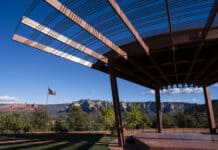
On Aug. 6, most of the bills passed by the Arizona State Legislature this session became law. One notable exception is Senate Bill 1350, which prevents local governments from banning property owners turning their homes into short-term vacation rentals. SB 1350 will go into effect after Saturday, Dec. 31.
The bill nullifies vacation rental bans currently in effect in only three cities: Jerome, Sedona and Scottsdale. Homeowners associations can still ban or restrict short-term vacation rentals through provisions in their bylaws.
The law allows homeowners to use services like HomeAway, VRBO and Airbnb to operate vacation rentals in areas zoned residential. An amendment to the bill allows these umbrella companies to collect the appropriate rental tax and distribute that revenue to the city and county to which the money is owed.
Despite the city of Sedona’s attempts to enforce its ban since 1994, numerous properties have operated illegally or under the radar for years. Now they can offer their property legally to short-term tenants. While this allows homeowners who rent their properties to earn revenue, there is already a shortage of affordable housing in Sedona, which various city councils have attempted to remedy since incorporation, to little or no effect.
A joke among long-time residents is that Sedona does have plenty of affordable housing: In Cottonwood and the Village of Oak Creek.
While SB 1350 may make sense in big cities in the Tucson and Phoenix areas, which has tens of thousands of rental properties, the bill threatens to dramatically change the demographics of Sedona.
In the short run, local hotels and resorts may see fewer guests who opt for vacation rentals. In the years to come, that could result in staff reductions, further reducing Sedona’s limited job market and shifting those workers to other towns and cities, which are offering more services and facilities year after year.
Finding a long-term rental property in Sedona is already a hard task, but if a significant portion of those homes, condos and duplexes become vacation rentals, Sedona renters may be slowly squeezed out of the market. Residents could opt to move to other areas of the Verde Valley, draining the city of families and seniors who rent. These workers may then find jobs closer to home meaning Sedona business will have to offer higher pay to entice commuters or compensate for higher rents.
If Sedona was the be-all-end-all economic generator of the Verde Valley it was a decade ago, this also wouldn’t be a problem for the city, but Cottonwood is growing from a commuter town into an economic powerhouse that now dwarfs Sedona in revenue as well as becoming a hub for nightlife and live entertainment.
The VOC is also growing, seemingly showing signs of transition from a retirement pass-through community into the first stop for tourists off Interstate 17. Should the VOC ever incorporate as a municipality and flex its potential, Sedona proper would risk losing its reputation as the Verde Valley’s destination city, especially if our traffic quagmire continues to worsen.
The current lack of hotel rooms in Cottonwood and the VOC will now be augmented by the influx of vacation rentals.
Arizona has a strong reputation among states of protecting individual private property rights. Property owners have wide latitude to what they wish with their land and buildings thereupon, so long as they obey the city, county and state rules and zoning ordinances.
Our state also has relatively strong tenant and renter protections, preventing unjust evictions without cause or prior to the termination of a lease. However, with SB 1350, there is nothing to prevent a homeowner from legally evicting a tenant or declining to renew a lease, then turning the property into a legal vacation rental.
With SB 1350 soon to become law, the question is not if Sedona will change, but how.


















